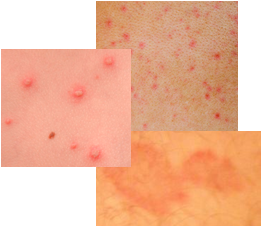Peanut Allergy Skin Rash
Visit this
PICTURES OF RASHES PAGE
A peanut allergy in most people can be a very frightening and extremely serious problem. Ingesting peanuts, contact with peanuts, or the aroma of peanuts and peanut containing products can cause allergic reactions in some people. A skin rash or more serious health effects can occur with this food allergen.
Severe Peanut Allergy

Peanut allergies get a lot of attention and this is for good reason. Allergic reactions due to peanuts and peanut containing products can be deadly. Severely allergic individuals need to carry an auto injector of adrenalin (commonly referred to as an Epipen) to deal with any serious symptoms. The symptoms can also be mild in nature. Mild peanut allergy reactions involve a skin rash, but no breathing problems. More information on mild and severe allergic food reactions can be found at the main food allergy rash page.
Peanut Cross Contamination
An allergy to this nut is very problematic, especially for children, because they are vulnerable to coming in contact rather easily with this food. This is due to cross-contamination, especially with peanut butter. Peanut butter is used widely and is very sticky and difficult to clean thoroughly. An unsuspecting peanut sensitive person may touch a surface that peanut butter was in contact with. If the surface was not properly cleaned, an allergic reaction can occur.
An allergy to peanuts is also problematic because peanuts and peanut products are found in or can contaminate so many different types of foods. This is because facilities that manufacture food products often do not have production lines dedicated to be free of peanuts and thorough cleaning of equipment is often difficult to perform. Foods of particular concern for peanut contamination include: baked goods, desserts, cereals, chilli, and snack foods.
Outgrowing an Allergy to Peanuts
It was initially thought that an allergy to peanuts was a lifelong allergy. However, recently some studies have shown that children may outgrow the allergy to peanuts. It terms of percentage, the number of children that outgrow the allergy to this food can be as high as 25 percent by the time they reach school age. This can only be confirmed with proper allergy tests performed by an allergist. The allergy tests involve skin pricks and blood tests to look for the level of peanut specific antibody. The allergic individual should never be challenged with the offending food to see if the person still reacts to it.
Alternative Names for Peanuts
Sometimes a peanut allergy rash or reaction occurs because the ingredient list does not clearly state peanuts are contained in the product. Peanuts may be listed under different names in ingredient labels (source: Canada Food Inspection Agency). Be careful when reading ingredients and always double check the ingredients you do not recognize to ensure they are not peanuts or peanut containing items.
Examples of alternative peanut names are:
- Arachide
- Arachis oil
- Beer nuts
- Cacahouète/cacahouette/cacahuète
- Goober nuts, goober peas
- Ground nuts
- Kernels
- Mandelonas, Nu-Nuts
- Nut meats
- Valencias
Other Resources
